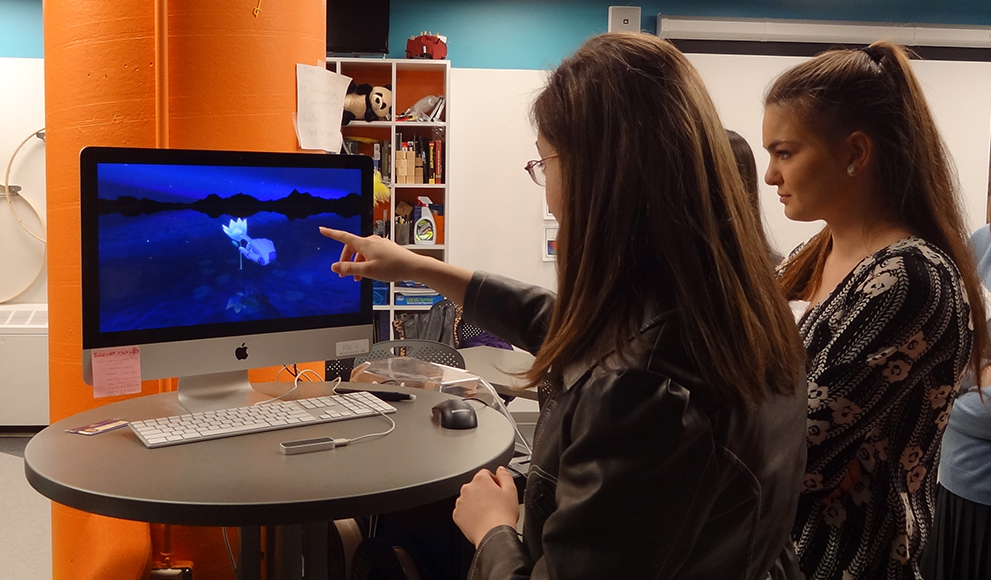Wellesley Hosted the NCWIT Award for Aspirations in Computing Celebration, Emphasizing the Importance of Women Helping Women

A few weeks ago, the College celebrated the message that women can and do make important contributions in STEM fields, including computer science, with the Massachusetts winners of the National Center for Women and Information Technology (NCWIT) Award for Aspirations in Computing (AiC). The award honors high school girls for their outstanding aptitude and interest in computing, and provides access to scholarship and internship opportunities, and to a peer network.
President H. Kim Bottomly welcomed the 30 winners and 21 runners-up, praising them for their achievements thus far in a field that remains heavily male-dominated. “I see the future of science and technology here, one that will include a great number of women,” she said. “Parents, thank you for supporting your daughters.”
Wellesley began offering computer science courses in the 1960s and was the first liberal arts college to join the Harvard-MIT online learning collaborative edX as well as the first women’s college to offer massive open online courses (MOOCs). "We've been doing CS here for a long time," Bottomly said. "Our faculty and students are creating new ways to interact with technology."
Prior to the awards presentation, recipients had a chance to see some of those interactions in the College's Human-Computer Interaction (HCI) Lab, which features eight MultiTaction displays that support collaborative interaction using touch and tagged objects, infrared pens, and personal devices.
Alyssa Wang, a senior at Prospect Hill Academy in Cambridge, was delighted to try some of the applications the displays make possible. "They definitely were a great example of all the amazing innovations that are possible with computers,” she said. “Seeing them helped confirm that CS is the right major for me."
Nicole Nieves, a senior at Framingham High, had the same reaction last summer when she interned in the HCI Lab. There, she gained experience with JavaScript and HTML and worked with the College’s International Genetically Engineered Machine (iGEM) team, which created an interactive museum exhibit to teach kids basic synthetic biology concepts.
"I loved the fast-paced way of going about things where you can just keep altering code and trying to solve a problem until you figure out what works," said Nieves, who is the only girl in her computer science class. "My experience in Wellesley's HCI Lab helped me decide that I would really like to pursue computer science as a career."
Honorees also had the chance to speak with Wellesley students about their experiences and challenges in computer science. "That was one of the best parts of the day," said Wang. "Getting to hear their stories about tech and who supported them (or didn't) really drove home how it important it is to be inviting and nonjudgmental in a field like this."
Eni Mustafaraj, assistant professor of computer science, helped organize the award celebration, along with 18 Wellesley student volunteers. She said the strength of both Wellesley's computer science department and the AiC program is the emphasis on having young women learn in a supportive environment. "Becoming proficient in a field like computer science requires a lot of time, motivation, persistence, and encouragement," she said. "By being in an all-women environment where everyone is at the same level (no men who have already had years of exposure to tinkering with devices and programming), students receive everything they need to develop their skills."
Volunteer Madeleine Barowsky '18, a computer science and math major who received an AiC award in 2013, said she appreciated being part of NCWIT’s vibrant community of technical young women.
"Through them, I hear about the latest tech news, programs, and scholarships and get to follow people's progress as they found startups, organize hackathons, and make the most out of conferences," she said. "We have great discussions about all sorts of things, and often someone else’s question (like about taxes or the workplace) will get me thinking and researching and keep me one step ahead of decisions I will eventually have to make."
Chimuanya Okoro '16, an American studies major and CS minor, also volunteered at the event. Last summer, she taught several computer languages to five high school students through the Girls Who Code immersion program at Google, one of NCWIT's strategic partners.
"It's very important for young girls to be exposed to computer science," said Okoro, whose brother started several online businesses and introduced her to computing. "It's important for there to be gender parity and more people of color in technology. Once that has been achieved, the field of computer science will be able to develop better tools that serve all of society."
